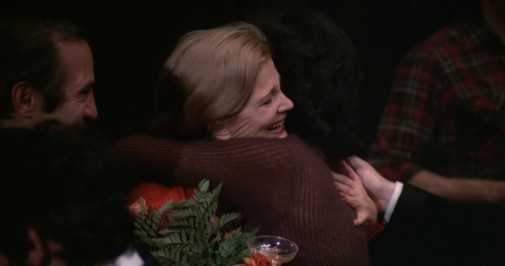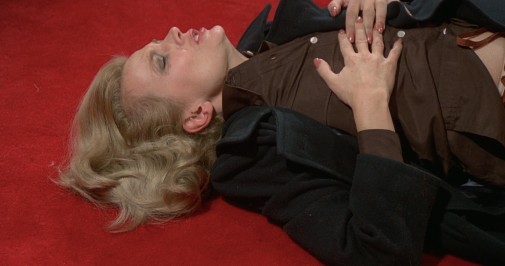
It's fair to say that Gena Rowlands is one of the most important screen actors of the 20th century. Her films made with husband, director, and costar John Cassavetes helped usher in a new kind of immersive realism that would thrive in the American indie scene for decades after the pair's heyday. To honor this acting genius, the Criterion Channel curated a collection of 10 films that feature some of Rowlands' most acclaimed work. For the Almost There series, I'm interested in those achievements that got some awards glory while not scoring any recognition from the Academy. After her Oscar nomination for 1974's A Woman Under the Influence, Gena Rowlands returned to the awards discussion with 1977's Opening Night…
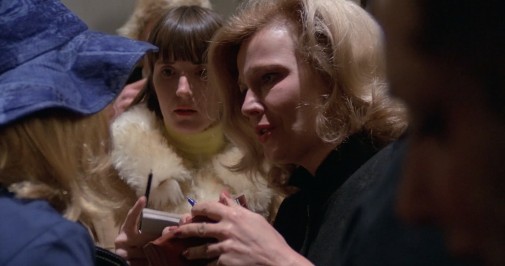
I love actors. I love working with them, watching them work, seeing them on screen and stage. During this pandemic, the few weeks I got to spend on an artistic residency workshopping a play were some of the most bearable, partly because I got to participate in the process of actresses creating new realities out of a simple idea. No wonder, I love John Cassavetes’ Opening Night. While I'm not the biggest fan of the director's brand of chaotic realism, I'll always credit him with understanding actors like few other film directors in the medium's history. Not just getting how to portray them on-screen, but how to direct them, liberate their capabilities, and put everything in place so that we, as an audience, can partake in his understanding. Focused on the tumultuous previews and rehearsals before the Broadway premiere of a new show, Opening Night may be the ultimate Cassavetes film about actors. In many ways, it's also his greatest testament to the wonder of Gena Rowlands.
Here, she plays Myrtle Gordon, a famous actress of both film and stage, who's struggling with the role of a menopausal woman in a play by aged writer Sarah Goode. One night, when exiting the theater, a young fan asks her for an autograph and, not satisfied with the paltry signature, follows the cast to their car. In a scene that would be referenced in Almodóvar's All About My Mother, the teenaged fan is ran over in the pursuit of her idol's attention and dies. However, unlike the Spanish melodrama, Cassavetes' film is more interested in the actress than her fallen fan's mother. After that inciting incident, Myrtle unravels most spectacularly, self-sabotaging her way to a breakdown that finds her seeing the dead girl and self-medicating with copious amounts of alcohol. It all comes to a head on the titular opening night. Will the show go on?
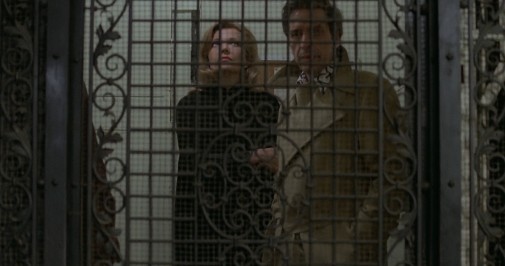
Opening Night's an ungainly beast of a movie, unfocused and often meandering at nearly two and a half hours. Such words could describe a fault, but, in this case, they serve to illustrate the work's mercurial potency. Like its protagonist, Opening Night spends most of the indulgent duration trying to find its way out of one mighty crisis. It often drives headfirst into walls of divagation, but the crash is fantastic to observe. At a certain point, the failure to find one single path becomes its own sort of inchoate triumph. The film and central performance challenge us at every step. When Rowlands speaks the line "I seem to have lost the reality of the reality," she's summarizing Myrtle's plight and articulating the essence of Opening Night. In those words, we can find all this picture has to say about the actor's purpose, the performance each person brings to everyday life, the impossibility and raging necessity of it all.
On re-watch, one of the elements I've come to appreciate about Rowlands' performance of Myrtle is how little she signals the incoming importance of the fan's death. The jumbled editing and restless camera confer a sense of primal unease to the scene, but the actress does little to underline the tectonic shift that's about to happen. Hers isn't the cinematic body that flinches before a hit – which makes it doubly ironic when Myrtle can't help but anticipate a theatrical slap. The moment of death and its impact come, and we genuinely feel like the rug's been pulled out from underneath Myrtle's feet. Furthermore, she conspicuously avoids making the aftermath of the trauma too much of a big deal, immediately flinging herself into a game of aloof sensuality in her hotel room. At a certain point, the porous barrier between acting and being becomes challenging to parse out, both for her and for us.
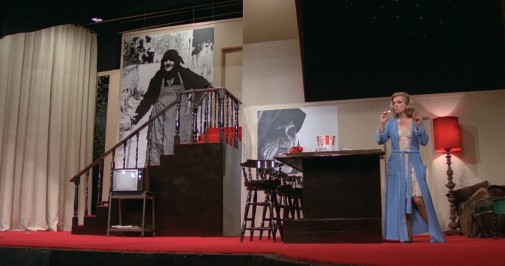
Another aspect that jumps out is how unfocused Myrtle seems in the first run-down of the play. The accident might have thrown gasoline on the fire. Still, there was already a flame of insecurity and confusion blazing inside the thespian. Every day she changes the text, conjuring a million different versions of the play. In rehearsals, Myrtle succumbs to the pressure, rolling around on the floor as if she were a baby in a tantrum. It's grotesque, but Rowlands was never a performer afraid of being grotesque. Myrtle reveals herself as a little chaos gremlin during another spoiled preview, wrecking parody through the tragedy. While we may laugh, there's anxiety within the scene's alchemy. On stage, this actress feels powerful, dangerous, as in control as she's out of it, and we grow to fear what she'll do next. It's no surprise that this spurs on the vexation of Joan Blondell's Sarah.
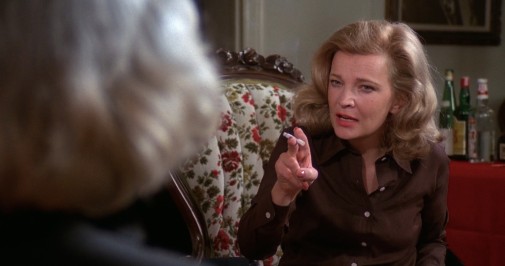
The scratching tension between actress and playwright is catalyzed by the different approaches and dramatic legacies their performers bring to the table. As Rowlands plunges into the depths of actorly self-reflection, Blondell cuts right through it with wry coldness. It's the New Hollywood Cinema fussing about loose experimentation and then punctured by Old Hollywood's discipline. Neither approach is better than the other, but they are essentially antagonistic, making for an electric charge whenever they interact. Explaining her purpose as an actress to Sarah makes for a breathtaking bit of dialogue-heavy acting from Rowlands' Myrtle. She loses herself in words before a rude comment from the other woman causes her to detach from the conversation. She remains startlingly vulnerable, but she's no longer playing herself to her conversational partner. Instead, she's now playing for us, just the camera and the audience, snubbing the other woman with hilarious shamelessness.
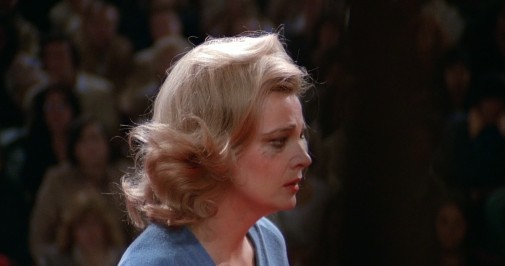
During its most unhinged passages, Opening Night further suggests a haunting that transcends the actress' angst, as the realm of ghostly apparition superimposes over the theatre milieu. Is it madness that makes Myrtle see the young woman who died, or is it all a surreal metaphor for guilt? Is it a spirit visiting her, or is it just her barely-hidden alcoholism showing its ugly head with hallucinations to spare? In either case, her fear feels genuine, as does her morbid fascination and attachment to the vision of dead youth. Rowlands both underplays and overplays Myrtle's awareness of the spirit. Depending on the scene, she conjures an uncertainty that puts the audience in a state of constant alert. We can never be sure of what Myrtle we're going to get, whether the pragmatic dismissive actress or the woman who submits to the horrors from beyond in a trance-like state.
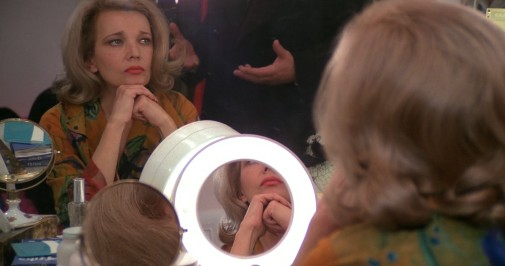
In more ways than one, both Myrtle and Rowlands are an actress possessed. They're possessed by mad genius, by a ghost, an inferiority complex, self-doubt, and a thousand other elements that both women must juggle to keep us entertained. That's not easy to do when saddled with such a text as what Sarah has provided Myrtle. While it's never easy to understand the nature of The Second Woman, the play inside the film, one gets a whiff of mediocrity from it. The staging feels conventional to a fault, with a light design that makes everything look flat and lifeless. However, both the meager quality of the exercise as well as its undefinition feel deliberate. We cannot be sure of what Myrtle is changing from the text since it's possible we never see a single passage of it that hasn't been changed beyond repair by the off-the-rails performer.
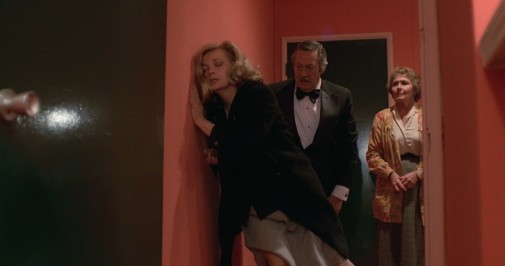
Often in film, when art is portrayed, it's difficult to discern if what we're seeing is supposed to be a success or a rotten disaster. By leaving the possibility of both realities, Opening Night reaches a bizarre sort of ambivalent balance. Here's the thing, though. In the end, that ambivalence evanesces, and an impression of drunken genius shines through, at long last. Are we watching the play's characters, or are they just Myrtle and her fellow actor riffing off each other, turning their off-stage dynamic into theater? Going into the depths of postmodernist meta-cinema, is this just a scene of Gena and John fucking around in front of the camera? Of course, it's all three, for every question Opening Night asks must have many equally valid answers. For as much as we've been watching two hours of a wreck wrecking itself further into oblivion, Myrtle finds a way into the character, even if she's barely conscious while doing it.
Rowlands' brilliancy twists Opening Night out of shape with a barrage of awkward improvisation and a vaudevillian verve. If this seemed, until now, like a free-wheeling spiral, its leading lady reformats the story as one of ecstatic self-fulfillment, liberation by pure havoc. Because we've been so close to destruction, Myrtle's insane victory and the on-screen audience's validation are especially sweet. Indeed, Rowlands' balancing act is enough to propel the film's viewers from their seats. We, too, want to stand up and applaud. Against all odds, Myrtle has managed to save herself for a single performance. And thus, Opening Night crystalizes that ineffable feeling those who've worked in the theater have grown accustomed to, maybe even addicted. After a seeming eternity of fruitless hard work, after eviscerating the soul, burning fingers, and spilling tears, the end result fills one with a sense of wholeness, even if only for one fleeting moment.
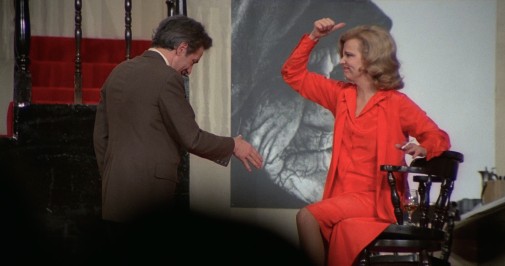
Opening Night premiered on Christmas Day 1977, the prelude to a lackluster American release that got harsh reviews and the audience's disinterest. Two months later, when the film was screened in competition at the Berlin Film Festival, reactions were more positive, with Rowlands walking away with the Silver Bear for Best Actress. It does seem like non-American audiences responded better to the film considering it also got two nominations from the HFPA, Best Actress for Rowlands and Best Supporting Actress for Joan Blondell. However, at the Oscars, Cassavetes' feature flopped hard, earning zero nods. The 1977 Academy Award lineup for Best Actress consisted of Anne Bancroft and Shirley MacLaine in The Turning Point, Jane Fonda in Julia, Diane Keaton in Annie Hall, and Marsha Mason in The Goodbye Girl. Keaton would win the trophy, while Rowlands would receive a second Oscar nomination for Cassavetes' 1980 flick Gloria. She never won the competitive prize but, in 2016, she was awarded an Honorary Oscar.
